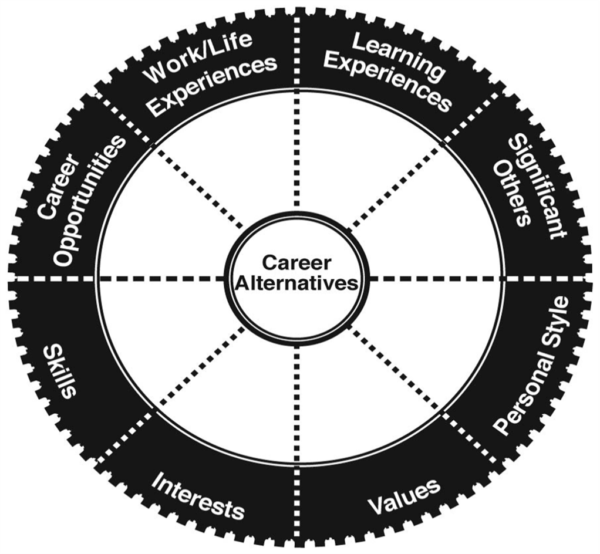
Find out what you like doing best and get someone to pay you for it.
As you have already chosen your program of study, you may think you have completed your career exploration. Nothing could be further from the truth! Your program could lead to an endless number of career opportunities and a specific focus will be important as you look for work.
The first step in any career exploration process is to know yourself and recognize what, and who, might influence your career decisions. With this information, you can begin to explore the world of work, looking for where you might best fit. Of course, many of the factors that influence career choice can change over time, making it important to engage in this process of exploration often.
Amundson’s and Poehnell’s Career Wheel is a valuable framework for any career exploration process. The Wheel has 8 sections, each separated by a dotted line indicating that the section may expand or contract depending on how important it is. The top half of the Wheel are external factors, such as your significant others or the opportunities available in your community. The bottom half are internal factors such as your skills and interests. The centre – Career Alternatives – are all the options that might surface during your exploration. Let’s explore these in greater detail.

Figure 1: The Wheel, Reproduced with Permission, from Career Pathways, 3rd Edition, by Norman Amundson & Gray Poehnell, 2004.
Internal Factors
This refers to what you are good at, whether through learning and practice, or an innate talent. Most important in career exploration and job search are your “Motivated skills” which are skills you have but also that you enjoy doing. After all, any career that is forcing you to use skills you don’t really like to use can be demoralizing and frustrating, making long term career satisfaction unlikely.
This includes the things you like or love to do, plus, the things you are passionate and curious about. Some interests focus more on personal activities or hobbies with little emphasis on work. Other interests might be strictly work related. It makes sense that what you do at work should be something that interests and excites you.
These are the beliefs, feelings, and principles that guide you. These may have strong ties to family of origin and religious or cultural affiliation. There will often be a set of core values that remain strong and true regardless of circumstance. People may also have career or work values which focus on what’s most important to be able to live out through your work.
This is all about the type of person you are – your personality type, your traits, or your characteristics. Those innate things that make you, you. Some of these will be relatively stable but other traits may come and go, evolving as you get older or seeming to change depending on your environment.
To learn more, watch our webinar The Career Wheel Part 1: Exploring the Fit Between You and Your Career Choice or book an appointment with a Career Advisor to discuss opportunities to explore these factors in greater detail.
External Factors
This is all about the local labour market, what types of jobs and industries may be available to you based on where you prefer to live and work. This can be a critically important step in your career exploration, if there are limited opportunities in your community you may find some of the other factors can’t be as much a priority.
Over time, your work and life experiences will impact the type of person you are, and, upon reflection, there are probably several themes or patterns that emerge. These may help guide you in determining the type of work you want to do, industry you’d like to work in, or people you’d like to work with. It is also important to consider career opportunities that will support your life goals.
As a student, this likely makes you think of your formal education, but learning experiences occur across many areas of life. Consider the learning experiences you’ve had that create opportunity for work, such as completing a degree or finishing a certification. In career exploration, it is also important to consider learning goals. If a career alternative requires several more years of school, and that isn’t feasible for you, then that career may not be right for you.
This can include people who have had a significant role in your life in the past, plus, those that are significant today. Each of these will have the potential to influence your career decisions – sometimes family can have a huge impact on the type of work you choose – and be influenced by your decisions.
To learn more, watch our webinar:
- The Career Wheel Part 1: Exploring the Fit Between You and Your Career Choice
- The Career Wheel Part 2: Exploring External Factors Affecting Your Career Choice or book an appointment with a Career Advisor to discuss opportunities to explore these factors in greater detail.
